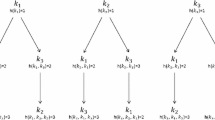Abstract
We consider the problem of fair allocation in economies with indivisible goods. Our primary concept is that of an envy-free allocation, that is, an allocation such that no agent would prefer anyone else's bundle to his own. Since there typically is a large set (a continuum) of such allocations, the need arises to identify well-behaved selections from the no-envy solution. First we establish the non-existence of ‘population monotonic’ selections. Then we propose a variety of selections motivated by intuitive considerations of fairness.
Similar content being viewed by others
References
Alkan, A.: 1994, ‘Monotonicity and Fair Assignments’,Economic Theory 4, 605–616.
Alkan, A., Demange, G, and Gale, D.: 1991, ‘Fair Allocation of Indivisible Objects and Criteria of Justice’,Econometrica 59, 1023–1039.
Aragones, E.: 1992, ‘A Solution to the Envy-Free Selection Problem in Economies with Indivisible Goods’, Northwestern University mimeo.
Chaudhuri, A.: 1986, ‘Some Implications of an Intensity Measure of Envy’,Social Choice and Welfare 3, 255–270.
Chun, Y.: 1986, ‘The Solidarity Axiom for Quasi-Linear Social Choice Problems’,Social Choice and Welfare 3, 297–310.
Crawford, V.P. and Heller, W.P.: 1979, ‘Fair Division with Indivisible Commodities’,Journal of Economic Theory 21, 10–27.
Diamantaras, D. and Thomson, W.: 1990, ‘An Extension and Refinement of the No-Envy Concept’,Economics Letters 33, 217–222.
Foley, D.: 1967, ‘Resource Allocation and the Public Sector’,Yale Economic Essays 7, 45–98.
Kolm, S.C.: 1972,Justice et Equité, Paris: Editions du CNRS, Paris.
Luce, R.D. and Raiffa, H.: 1957,Games and Decisions, New York: Wiley.
Maskin, E.: 1987, ‘On the Fair Allocation of Indivisible Goods’, inArrow and the Foundations of the Theory of Economic Policy, Edited by G. Feiewl, London: Macmillan.
Moulin, H.: 1990, ‘Fair Division under Joint Ownership: Recent Results and Open Problems’,Social Choice and Welfare 7, 149–170.
Moulin, H.: 1992, ‘An Application of the Shapley Value to Fair Division with Money’,Econometrica 60, 1331–1349.
Pazner, E. and Schmeidler, D.: 1978, ‘Egalitarian-Equivalent Allocations: A New Concept of Economic Equity’,Quarterly Journal of Economics 92, 671–687.
Schmeidler, D.: 1969, ‘The Nucleolus of a Characteristic Function Game’,SIAM Journal of Applied Mathematics 17, 1163–1170.
Sen, A.K.: 1970,Collective Choice and Social Welfare, Amsterdam: Elsevier.
Svensson, L.G: 1983, ‘Large Indivisibles: An Analysis With Respect to Price Equilibrium, and Fairness’,Econometrica 51, 939–954.
Tadenuma, K.: 1989, ‘On the Single-Valuedness of a Solution for the Problem of Fair Allocation in Economies with Indivisibilities’, University of Rochester mimeo.
Tadenuma, K. and Thomson, W.: 1991, ‘No-envy and Consistency in Economies with Indivisible Goods’,Econometrica 59, 1755–1767.
Tadenuma, K. and Thomson, W.: 1993a, ‘The Fair Allocation of an Indivisible Good When Monetary Compensations are Possible’,Mathematical Social Sciences 25, 117–132.
Tadenuma, K. and Thomson, W.: 1993b, ‘Games of Fair Division’, University of Rochester Working Paper No. 351,Games and Economic Behavior forthcoming.
Thomson, W.: 1983, ‘The Fair Division of a Fixed Supply among a Growing Population’,Mathematics of Operations Research 8, 319–326.
Thomson, 1994, ‘Fair Allocation Rules’, University of Rochester mimeo.
Thomson, W.: 1995, ‘Population-Monotonic Allocation Rules’, Chapter 4 inSocial Choice, Welfare and Ethics (W.A. Barnett, H. Moulin. M. Salles and N. Schofield, eds) Cambridge University Press, 79–124.
van Damme, E.: 1987,Stability and Perfection of Nash Equilibria, Springer-Verlag, Berlin.
Author information
Authors and Affiliations
Rights and permissions
About this article
Cite this article
Tadenuma, K., Thomson, W. Refinements of the no-envy solution in economies with indivisible goods. Theor Decis 39, 189–206 (1995). https://doi.org/10.1007/BF01078984
Issue Date:
DOI: https://doi.org/10.1007/BF01078984




